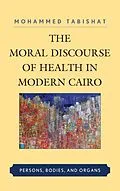In The Moral Discourse of Health in Modern Cairo: Persons, Bodies, and Organs, Mohammed Tabishat posits that health care practices in Egypt constitute an index to read the way political, economic, and social conditions are experienced by those who use, embody, or live them and cope with their outcomes. These practices carry the code of the socio-cultural matrix in which they are embedded; they speak of the rationalities of different help-seeking efforts. In doing so, they represent the moral principles underlying the social efforts to alleviate pain and maintain life as a whole. Health-related practices in this sense constitute a critical platform to know, feel and live in both the physical and moral sense.
Autorentext
By Mohammed Tabishat
Zusammenfassung
In The Moral Discourse of Health in Modern Cairo: Persons, Bodies, and Organs, Mohammed Tabishat uses anthropological descriptive methods and discourse analytic perspectives to focus on health care practices in a holistic fashion aimed at preserving and improving life in contemporary Cairo. Tabishat employs therapeutic data as a complex index mirroring the existing relations of power and the various ways they are involved in maintaining and challenging the social order.
Inhalt
List of tables and figures
Acknowledgments
Introduction: Society in Medicine and Health
Chapter One: Health of "Modern" Life: Examples from self-guides
Chapter Two: Family Life, Health, and Illness in Bulaq Abul'ela
Chapter Three:'I??agh?: Biomedicine for Social Critique
Chapter Four: Society in Life and Death
Chapter Five: Ethnography as Cultural Critique
Index
About the Author
